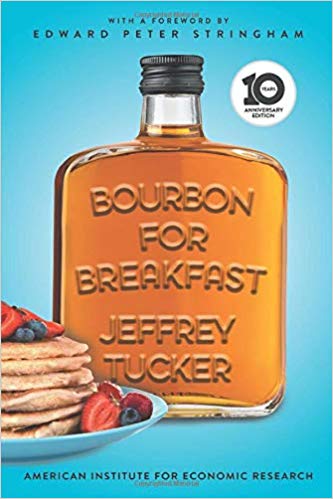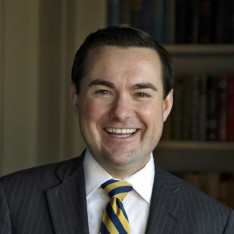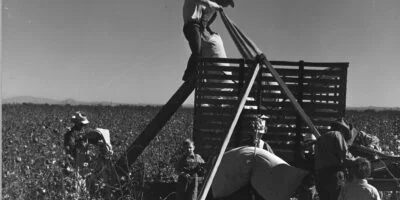Bourbon for Breakfast: How to Love Liberty and Love Life

Are you bothered by bureaucrats, but do you still love life? If so, Bourbon for Breakfast is for you. Jeffrey Tucker’s essays are a masterful parody of government and a celebration of little things that make the world a better place. Murray Rothbard referred to H.L. Mencken as a joyous libertarian who engages the world but at the same time “enjoys himself immensely at this spectacle of folly” and Tucker certainly follows this path.
When reading Bourbon for Breakfast I find myself smiling, often not knowing whether a statement is serious or in jest, but I think almost all are serious. Did you know, for example, that a fan is the key to happiness? “On it came, and with it, life itself. The night was suddenly glorious, clean, and happy. All dreams were dreamy. I awoke and there was once again music in the air, the feel of flowers, the sound of birds.”
Bourbon for Breakfast, now in its 10th-anniversary edition published by the American Institute for Economic Research, is written in a whimsical way, but Tucker makes some very important points. First, Tucker counters the idea that bureaucrats, and the government itself, exist to help people. For example, Tucker describes his experience in court for a traffic violation, but he goes on to describe the others in court that the government was threatening with much more serious charges.
Tucker writes, “Most people in my position would have never gone to court, and they will never see just how cruel this system is for the poor, for minorities, and for everyone who gets tangled up in this web of coercion and legalized plunder. But now I understand something more fully that I once only understood abstractly. I see how utterly ridiculous it is to think that the state can be the right means to help those who are poor or living at the margins of society.”
Tucker presents bureaucrats in a less than pleasing light, but his vision is not bleak. Rather than going on an angry diatribe that depresses the reader, Tucker describes ways to overcome problems that bureaucrats create, however big or small. Did you know that regulations restrict home water heaters to temperatures “at which yeast thrives” (gross!) but that some simple tinkering can get around it?
Tucker writes, “Indeed, with a water heater set at 130 degrees, all is right with the world — at least that part of it that you can control. Even if the whole world is conspiring against civilization, you can preserve your part of it with the smallest turn of a screwdriver.” In this book you can also read about everything from “Mark Twain’s Radical Liberalism” to “How to Dress Like a Man.”
I can only speculate about the latter essay’s positive influence, but I can say that, at least in the circles I observe, libertarians are far better dressed than ever before. Read it and heed his advice (and, yes, buy those Alden shoes).
Bourbon for Breakfast spans economics, literature, fashion, and the good life in general. Why sit around being depressed about government when we can mock it and work to diminish its influence? Before I conclude I should add a disclaimer about the title of the book. For those not interested in drinking bourbon, please don’t be turned off by it or don’t take the title too literally.
Even though my research indicates that drinkers earn more money than non-drinkers, Tucker does not insist you have bourbon for breakfast. Instead, Tucker praises what I consider healthier alternatives including brandy, wine, and champagne: “You can try this at home. Wake up late, shower, and then pull out and open a chilled bottle. The action alone creates a bigger rush than you can get from any evening martini.”
This, of course, is apodictically true. Tucker concludes, “A final note on a frequent objection: morning drinking diminishes one’s productivity during the day. This is true, of course, but particularly for adults who process liquor more slowly. This underscores a point that cannot be emphasized enough: like smoking, morning drinking is particularly suited for the young, meaning under the age of 25. Their systems are robust and can handle it better. Don’t waste your youth: it is up to you to bring back the breakfast drink!”
Of course, also work hard and advance liberty, but have fun in the process. You too should have Bourbon for Breakfast. Give it to your friends. Read an essay here or there, or read all the essays at once, and help make the world a more beautiful place.
References:
Peters, Bethany, and Edward P. Stringham. 2006. “No Booze? You May Lose: Why Drinkers Earn More Money Than Nondrinkers.” Journal of Labor Research, 27(3) Summer: 411-421.
Stringham, Edward P. (Ed.) 2007. Anarchy and the Law: The Political Economy of Choice. Somerset, NJ: Transaction Publishers.











